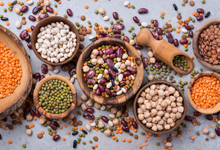
Want to look 19 years younger than you are? Sorry. This isn’t a story about that. But you can make your brain appear nearly two decades more youthful simply by following a Mediterranean diet.
A new study published in the journal Neurology, looked at the brains of 581 people who donated their bodies to science. Comparing data about the participants’ diet while alive with their brain autopsy results, the researchers found that the brain tissue of people who followed the Mediterranean diet, along with the Diet Intervention for Neurodegenerative Delay (MIND), contained fewer telltale signs of Alzheimer’s disease.
In fact, those who ate the most leafy greens looked nearly 19 years younger in terms of plaque buildup than those who ate one or fewer servings per week.
Hoag doctors are not surprised. Aaron R. Ritter, M.D., director of the Memory & Cognitive Disorders Program in Hoag’s Pickup Family Neurosciences Institute, and Elizabeth R. Raskin, M.D., surgical director for the Margolis Family Inflammatory Bowel Disease (IBD) Program within the Digestive Health Institute at Hoag, said the mind-gut connection is strong. Neither doctor was involved in the study.
“This study supports what we’ve seen in cognitive research involving living Alzheimer’s patients,” Dr. Ritter said. “How you treat your body, what you eat, affects your total health.”
Dr. Raskin said diet plays a significant role in inflammation, which has implications for everything from allergies to Alzheimer’s.
“As we learn more about how overall inflammation stresses the body and the brain, the more important it becomes to address the role of diet and digestive health,” she said.
What Should You Eat for a More Youthful Brain?
 Daily servings of dark, leafy greens: arugula, collards, dandelion greens, endive, grape leaves, kale, mustard greens, romaine lettuce, spinach, Swiss chard and turnip greens. These are packed with bioactives, chemicals in foods that reduce inflammation.
Daily servings of dark, leafy greens: arugula, collards, dandelion greens, endive, grape leaves, kale, mustard greens, romaine lettuce, spinach, Swiss chard and turnip greens. These are packed with bioactives, chemicals in foods that reduce inflammation.
 Two weekly servings of berries. More than any other fruit, berries, such as blackberries, blueberries, raspberries and strawberries, pack the biggest brain-protective bang for the buck.
Two weekly servings of berries. More than any other fruit, berries, such as blackberries, blueberries, raspberries and strawberries, pack the biggest brain-protective bang for the buck.
 Three daily servings of whole grains. Examples include wild rice, sorghum and quinoa. Be careful to read the labels, however, “whole grain” does not always mean healthy. Steer toward whole grain foods that are high in fiber and that have few other ingredients.
Three daily servings of whole grains. Examples include wild rice, sorghum and quinoa. Be careful to read the labels, however, “whole grain” does not always mean healthy. Steer toward whole grain foods that are high in fiber and that have few other ingredients.
 Four meals a week of beans. Get out our pandemic cookbook. Legumes and pulses are excellent and inexpensive sources of protein, vitamins, complex carbohydrates and fiber – all heroes in the Mediterranean and MIND diets.
Four meals a week of beans. Get out our pandemic cookbook. Legumes and pulses are excellent and inexpensive sources of protein, vitamins, complex carbohydrates and fiber – all heroes in the Mediterranean and MIND diets.
 One to two tablespoons of healthy fats. One of the key components of a Mediterranean diet is extra virgin olive oil. This healthy fat is shown to help minimize the risks of degenerative brain disease and reduce neuroinflammation.
One to two tablespoons of healthy fats. One of the key components of a Mediterranean diet is extra virgin olive oil. This healthy fat is shown to help minimize the risks of degenerative brain disease and reduce neuroinflammation.








